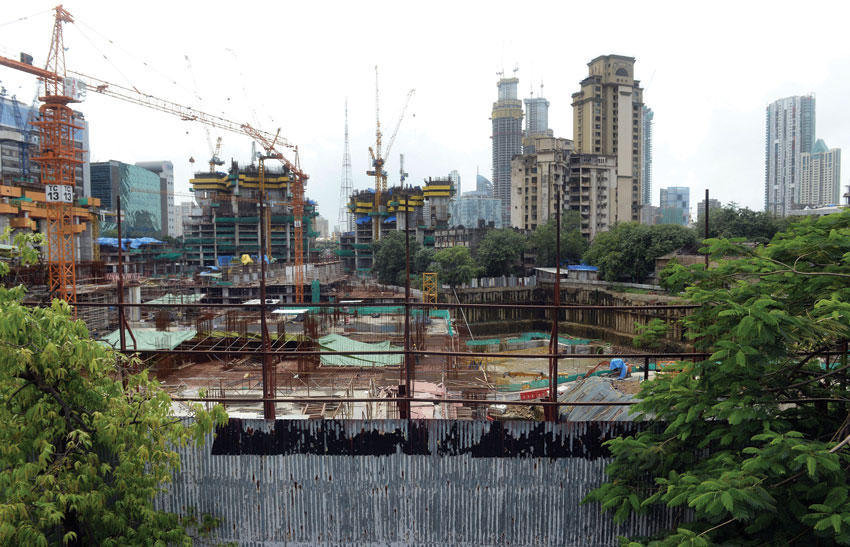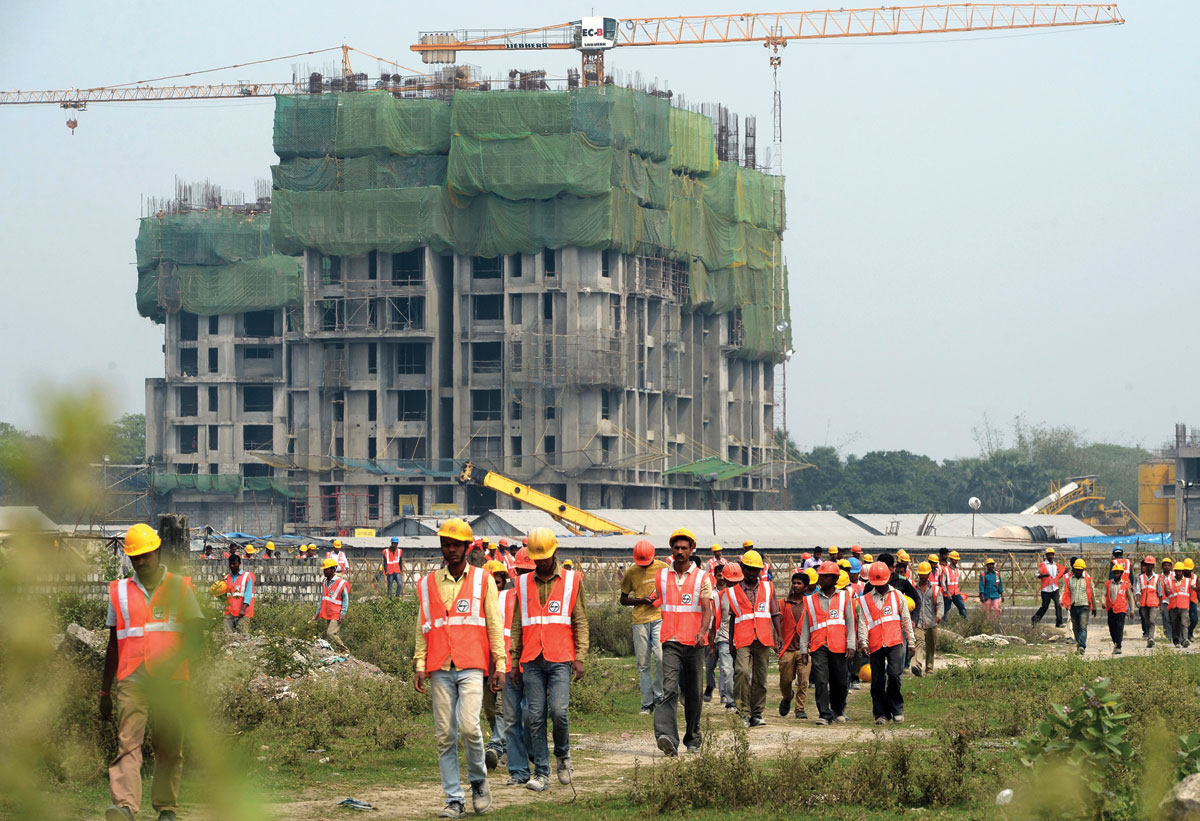A SHORT-TERM ‘REALTY’ CHECK?
Indian construction laborers walk to their shelter during a shift change at a housing project construction site in Kolkata, Mar. 1. The Indian government came to power nearly two years ago promising to transform India’s economic fortunes. But it has been hampered by the global economic slowdown and a failure to push much-needed reforms through parliament. Finance Minister Arun Jaitley acknowledged the challenges as he presented the budget in parliament, but said he had a “vision to transform India.” (Dibyangshu Sarkar | AFP | Getty Images)
India’s real estate sector is witnessing a reality check or correction in recent times. Reforms and initiatives like the real estate sector bill have been ushered in by Narendra Modi’s government in last two years but contrary to pundits who predicted that there would be some hope and appreciation in property prices, it is not so, writes Priyanka Bhardwaj. – @siliconeer #siliconeer #india #realestate #indiaproperty
Speaking of mainly the top tier metropolises (Delhi-National Capital Region, Mumbai, Chennai and Bengaluru), it is certainly not an investors’ season but a bonanza time for buyers, rather so called “end users,” who can choose from a plethora of discount offers and distress sales, hinting towards a maturing market.
The top metros are invariably amongst the investors’ destinations on account of presence of comparatively modern infrastructure, employment opportunities, medical facilities, educational institutions, better security and a diversity of socio-cultural centers as against other two tier towns and spaces of work and residence.
Hence there has always been a mad rush among both residents and non-residents to own a home, piece of land or an apartment for immediate or old age living in these islands of prosperity and good living.
Yet with erosion of confidence among buyers and poor financial liquidity, investors rue apparent and real difficulties in pulling out their funds, even at a loss, from multiple ventures.
As matters stand realty has touched the stagnation point in terms of sale and rentals.
In last quarter of 2015 investments yielded just about 2% appreciation in all metros except Mumbai where the rise was marginally higher, by 3.3%.
Property agents admit that collapse in annual lease rentals (dipped to 1.5%) has driven away erstwhile investors.
A forecast of 6-7% appreciation, predicted for 2015, has now been shifted to 2016 but then it remains too doubtful going by emerging stories of the day.
Everyday there are stories of projects being delayed by many years, malpractices being adopted by developers to gain approvals, builders routing funds they have collected for a specific project to another one, developers abandoning the project even after taking 80-90% of the cost from gullible buyers, use of substandard construction quality, deviation in project plans to appropriate common areas, and change in apartment layouts to charge customers more, etc.
In each of these cases where the developers and their associates have erred or acted duplicitous and continue to lead kosher lives with absolute impudence it is invariably the buyers who face the brunt, both financially and emotionally.
Recently buyers have started resorting to Twitter, venting their frustration and calling for action against defaulting developers and one such episode resulted in the brand ambassador of the real estate firm, Indian Cricket team Captain M.S. Dhoni resigning in protest.
The defaulters’ list is endless: Jaypee Group, Supertech, Parasvanath, Emmar-MGF, ABP Developers, Cosmos, 3 Cs to name a few—all of whom have unfinished projects in all major regions.
In Mumbai too DB Realty and Hubtown, a prominent firm, faced the buyers’ rage on every forum as the firm offered chopper tours to prospective customers of its luxury project in South Mumbai, DB Crown, when it cannot deliver 3,600 apartments in DB Ozone in Dahisar for the past 8 years.

The implementation of three crucial lifelines – The Dwarka Expressway, the Southern Peripheral Road and the Northern Peripheral Road – to connect upcoming residential townships / sectors of Gurgaon has been stuck since 2005.
While the land has been acquired from the farmers, the Haryana Urban Development Authority has declared that it has no money to compensate the ousted farmers, thus leaving the roads unconstructed.
Evidently buyers are wary of participating in the so called “bonanza time” especially if the projects are under construction.
When contacted not a single developer wishes to come on record on of these subjects and continue harping on “unfortunate delays on the part of government agencies.”
Speaking with the realtors’ apex body, CREDAI, it is learnt that currently a developer spends a minimum of 18 months to get hold of all government clearances and shortening of this time frame would be beneficial to all involved parties—developers, investors and buyers.
For any economy to pick up, construction is a vital component and to redress this the Narendra Modi government passed the RERA or the Real Estate Regulation Development Act which was notified, May 1.
State governments have been allotted a year’s time to set up their individual regulatory authorities which in turn are expected to arrive at decisions on the complaints of buyers and developers in 60 days.
However, for reasons best known to them, states appear to be in no hurry to establish these bodies and this could be an ample time for huge defaulters to escape offshores such as Dubai and London.
Case in point is the promoter of Emaar-MGF who has left India and Delhi’s grapevine suggests that Parasvanath and UNITEC developers who have been hauled up by the authorities too are planning on something similar.
Therefore, even as the real estate sector is in a super mess and no super normal growth is expected in the short run, sentiments are strong in long term for a few investors.
A chief investment announcement came in the first month of the year when a Chinese property giant, Dalian Wanda Group declared an investment of $10 billion in a major industrial park.
If figures from Kolkata, Pune and Hyderabad are anything to go by then the growth in housing units stood at 5-10% in 2015 on account of increased purchases by the end users.
While it may be foolhardy to expect immediate returns as Gulam Zia, ED – Advisory, retail and hospitality of Knight Frank (India) suggests that investments would require an estimation in the long term and that it may take a couple of years coupled with more policy changes, such as imposition of GST (to do away with multiple taxes – service tax, VAT, etc buyers have to pay for an under-construction project and add to approximately 20-25% of total cost) and controlling corruption, for a real big change to happen.
Till then the positives of the new Bill will only remain on paper!


